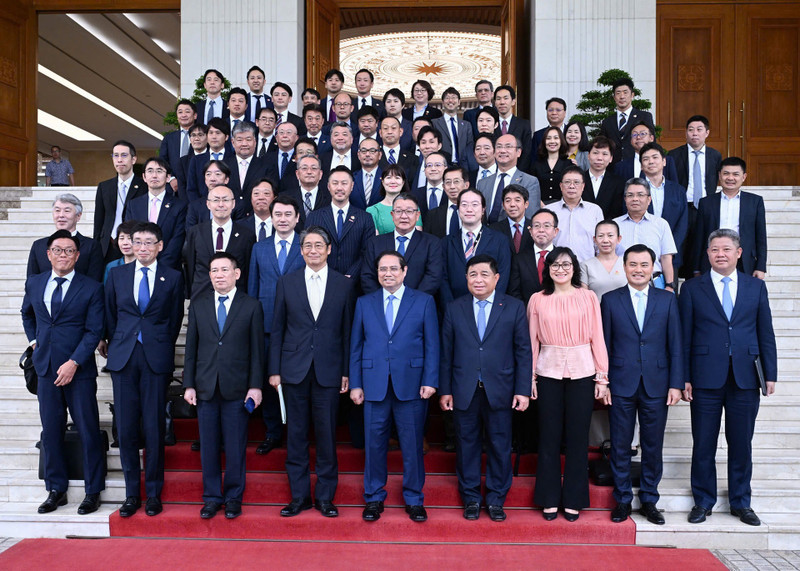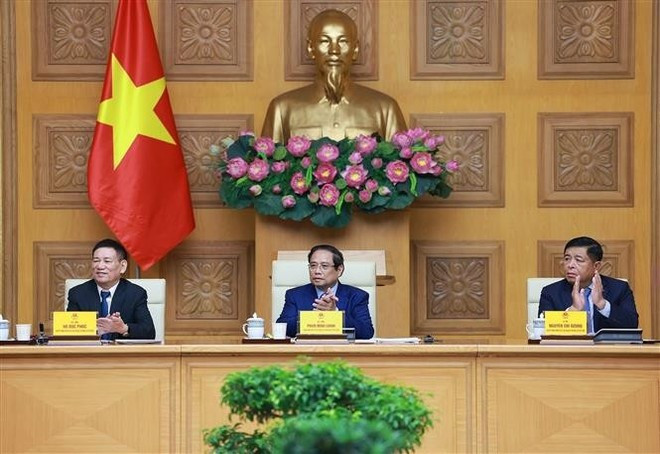Prime Minister Pham Minh Chinh on August 12 urged Viet Nam and Japan to establish a joint working group this month to coordinate efforts to address issues arising in reality, ensuring harmonious benefits and shared risks.

Prime Minister Pham Minh Chinh (centre, front) poses for a photo with Vietnamese officials and representatives of Japanese enterprises on August 12. (Photo: NDO/Tran Hai)
Speaking at his meeting with Japanese enterprises operating in Viet Nam – the second of its kind this year, PM Chinh stressed that if there are any issues going beyond the scope of existing regulations, they should be promptly submitted to competent authorities for appropriate and definitive resolution, avoiding prolonged delays. Lessons should also be drawn for ongoing and future projects.
He shared that Viet Nam is prioritising fast and sustainable development, with a focus on the green economy, digital economy, circular economy, and knowledge-based economy driven by science, technology, innovation, and digital transformation.
He called on all parties in Japan, including Japanese enterprises, to accompany and financially support Viet Nam by providing new-generation official development assistance (ODA) loans; investing in the Viet Nam International Financial Centre; and expanding investments in the country to create jobs, improve livelihoods, and train high-quality human resources, especially in fields such as artificial intelligence (AI), database, semiconductor, new and renewable energy, biotechnology, health care, and hi-tech agriculture.

Prime Minister Pham Minh Chinh (centre) at the meeting (Photo: VNA)
It is necessary to push ahead with transferring science – technology and smart governance practices, and providing policy recommendations to help Viet Nam improve its socialist-oriented market economy, PM Chinh said.
He also encouraged proposals on priority mechanisms to attract Japanese investment and support Vietnamese enterprises to participate in Japanese and global production and supply chains.
In response to Japanese firms’ concern of the plan to promote hybrid vehicles and restrict petrol-powered motorbikes within Ha Noi’s Ring Road 1 area, the Government leader emphasised that reducing emissions, protecting the environment, and combating climate change are comprehensive and global issues that require the collective efforts of the entire population, all levels of government, industries, and international cooperation to identify the most optimal solutions. These efforts must ensure a balance of interests among the people, businesses, and the State, guided by the shared goal of a greener and cleaner living environment.
He affirmed that the Party and the State of Viet Nam have no other goal than safeguarding independence and freedom, and bringing about happiness and prosperity to the people.
PM Chinh expressed his hope that Japanese enterprises will continue standing side by side with Viet Nam on the development path, thereby benefiting the two business communities, both countries, and their peoples, and continuously contributing to the "Viet Nam – Japan Comprehensive Strategic Partnership for Peace and Prosperity in Asia and the world".
Appreciating PM Chinh's strong leadership and setting of deadlines to solve outstanding issues between the two sides, Japanese Ambassador Ito Naoki stated that Japan will propose a new project, as well as new loan packages within the framework of the Asia Zero Emission Community (AZEC).
Japan remains one of Viet Nam’s most important partners, being the largest provider of ODA, the second-largest partner in labour cooperation, the third-largest in investment and tourism, and the fourth-largest in trade.
As of the end of July, Japan had run 5,608 valid projects in Viet Nam, with a total registered capital of 79.4 billion USD, ranking third among 151 countries and territories pouring capital into Viet Nam. Conversely, Vietnamese investors have undertaken 126 projects in Japan with a total registered capital of 20.5 million USD.
(Source: VNA)